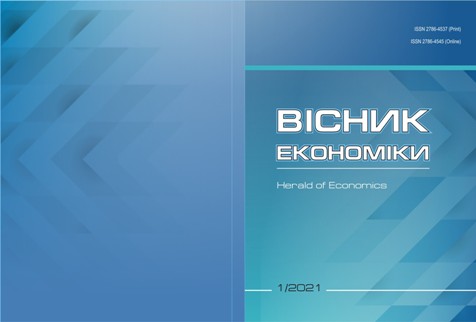Organizational forms of accounting of electronic transactions
DOI:
https://doi.org/10.35774/visnyk2024.03.172Keywords:
accounting, control, management, electronic transactions, organizational form, cluster variant of outsourcingAbstract
Introduction. An element of the organization of accounting for electronic transactions at the enterprise is the choice of the optimal organizational form. With the development of means of payment, centripetal and centrifugal trends in the organization of accounting and management alternately changed. Centralization (decentralization) of accounting takes place at the functional, software-technical, informational, territorial, structural and consumer levels. Each individual case of organization of accounting of electronic transactions may involve different organizational levels, which leads to combinational processing of accounting information. The need to research combined organizational forms determines the relevance of the article.
The purpose of the article is to develop the newest form of organization of accounting and management of electronic transactions as a further development of combined- centralized and combined-decentralized options with the aim of simultaneously delegating accounting and management powers to full-time employees and variable outsourcers.
Methods. Systemic, innovative, functional approaches and methods of generalization, bibliographic and comparative analysis were used in the process of realizing the established goal of scientific research.
Results. The presence of a significant number of limitations and shortcomings in the organization of accounting for electronic transactions according to the classic centralized and decentralized organizational options has been proven. The peculiarities of the combined- centralized form of electronic transaction accounting organization, which involves the autonomous collection of primary data and placement in centralized databases, as well as the combined-centralized form with the fo-rmation of a distributed database with fragmented access to it by users based on blockchain technology, have been studied. The concept of the latest organizational option, which corresponds to the current stage of development of electronic money and crypto-objects, has been developed, based on cluster combined delegation and remote performance by full-time personnel of the functions of accounting, control and management of electronic transactions. With the cluster organizational form, the division of functional responsibilities in the vertical (types of accounting, control, management) and horizontal (types of financial and economic processes or accounting objects) plane is provided for the outsourcing of accounting and management functions between variable outsourcers.
Conclusions and prospects for further research. The implementation of a cluster version of the organization of accounting in the field of electronic transactions ensures: consideration of information priorities and rights of access to information by users, maximization of benefits from a combination of delegation and independent implementation of functions by full-time personnel, distribution of functions between outsourcers taking into account the level of their competence, optimization of information flows of the enterprise, financial and cyber security of enterprises, etc. Therefore, the organizational features of ensuring financial and cyber security of enterprises in the context of accounting and management of electronic transactions require further research.
References
Іvakhnenkov, S. V. (2008). Informatsiini tekhnolohii v orhanizatsii bukhhalterskoho obliku ta audytu [Information technologies in the organization of accounting and auditing]. 4th ed. and additional. K: Znannia, 343 p. [in Ukrainian].
Sopko, V. V., Benko, M. M. (2010). Meta i pryntsypy avtomatyzatsii bukhhalterskoho obliku [Purpose and principles of accounting automation]. Aktualni problemy ekonomiky: Bukhhalterskyi oblik, analiz ta audyt – Actual problems of the economy: accounting, analysis and audit, 12 (114), 186-192. [in Ukrainian].
Popitich, T. V. (2010). Peredumovy ratsionalnoi orhanizatsii bukhhalterskoho obliku v spozhyvchii kooperatsii [Prerequisites for the rational organization of accounting in a consumer cooperative]. Ekonomichnyi analiz – Economic analysis, 6, 303-305. [in Ukrainian].
Butynets, F. F., Ivakhnenkov, S. V., Davydiuk, T. V., Shakhraichuk, T. V. (2002). Informatsiini systemy bukhhalterskoho obliku [Accounting information systems]: under the editorship Prof. F. F. Butynets, 2nd ed., revision. and additional. Zhytomyr: PP «Ruta», 544 p. [in Ukrainian].
Liu, Z., Wu, L., Ke, J., Qu, W., Wang, W., Wang, H. (2019). Accountable Outsourcing Location-Based Services With Privacy Preservation. IEEE Access, 1-1. DOI: https:// doi.org/10.1109/ACCESS.2019.2936582. [in English].
Maszczak, T. (2019). Accounting Outsourcing In Micro And Small Entities − Opportunities And Threats. Prace Naukowe Uniwersytetu Ekonomicznego we Wrocławiu, 63, 92-107. DOI: https://doi.org/10.15611/pn.2019.8.07. [in English].
Nicholson, B., Aman, A. (2012). Managing attrition in offshore finance and accounting outsourcing: Exploring the interplay of competing institutional logics. Strategic Outsourcing: An International Journal, 5. DOI: https://doi. org/10.1108/17538291211291765. [in English].
Muravskyi, V. V. (2017). Rehistry, formy obliku ta kompiuterno-komunikatsiini tekhnolohii [Registers, accounting forms and computer and communication technologies]. Naukovi pratsi Kirovohradskoho natsionalnoho tekhnichnoho universytetu. Ekonomichni nauky. – Scientific works of the Kirovohrad National Technical University. Economic sciences, 32, 231-239. URL: Available at: http:// nbuv.gov.ua/UJRN/ Npkntu_e_2017_32_25. [in Ukrainian].
Muravskyi, V. (2009). Zastosuvannia informatsiinykh tekhnolohii u pervynnomu obliku torhovelnykh, rozrakhunkovykh i transportnykh operatsii [Application of information technology in the primary accounting of trade, settlement and transport operations]. Visnyk KNTEU – Bulletin of KNTEU, 3, 69–76. [in Ukrainian].
Asatiani, A., Apte, U., Penttinen, E., Rönkkö, M. Saarinen, T. (2019). Impact of accounting process characteristics on accounting outsourcing – Comparison of users and non-users of cloud-based accounting information systems. International Journal of Accounting Information Systems, 34. DOI: https://doi.org/10.1016/j. accinf.2019.06.002. [in English].
Cullinan, C. & Zheng, X. (2017). Accounting outsourcing and audit lag. Managerial Auditing Journal, 32, 276-294. DOI: https://doi.org/10.1108/MAJ-03-2016-1349. [in English].
Zadorozhnyi, Z.-M., Muravskyi, V. Shevchuk, O. (2021). Influence of Organizational Factors and Forms of Accounting Outsourcing on Enterprise Cybersecurity. 11th International Conference on Advanced Computer Information Technologies (ACIT), 540-543. DOI: https://doi.org/10.1109/ACIT52158.2021.9548370. [in English].



